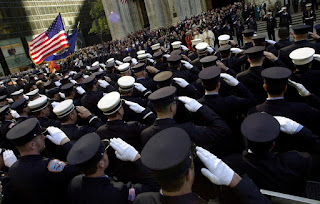Firefighting is rich in history and tradition, and it extends all the way through a firefighters life to the firefighter's funeral. Today I'd like to take a moment and address those traditions
For both a formal and a semi-formal funeral, the fire company should be outfitted in Class A uniforms. Class A uniforms are composed of department-issue navy blue coats, dress shirts, slacks, belt, and tie. All companies have slight variances in uniforms and policies, regardless of that, firefighters should be sure to coordinate outfits. In the event of a non-formal or a private service, the entire department as a unit should wear either uniforms of some type or civilian clothes. Traditionally, in a formal or semi-formal service, the company will stay together as one for the duration of the event. They will enter the church or funeral home together, sit or stand together, and leave together. When sitting together, the seating should be as follows: Fire Chief, President of the company or union, the deceased's company, department Chief Officers, members of department, and then members of other fire departments.
Firefighters in Class A uniform often wonder when to remove their cover (hat) during a funeral service. The firefighter's uniform hat, called the firefighter's "cover", should not be removed at any point during the funeral service. It would also be considered appropriate to salute the casket when it is moved. This includes lowering into the earth, and carrying down an isle. Since it is considered improper to salute uncovered, this is the reason a cover should be worn. Typically, in a non-funeral setting, the cover should be removed when indoors. There are few exceptions to this rule. The cover should always be worn when outdoors in uniform. Also, in general, the right hand should be kept free to offer a salute or handshake when in a dress uniform.
Deaths of department members are often commemorated by placing flags at half-staff. At fire stations, the flag should run at half-staff from the date of the death until 30 days have elapsed. In addition, funeral bunting, if used, should remain on the station and the union hall for this same time period. Badge covers should also be placed on each member’s badge for 30 days from the time of notification of the death.
Some firefighter funerals close with a bell ceremony and a reading of a prayer. In the ceremony, a bell is rung three times, as was traditionally done to signal the end of an alarm. In this case, the ringing signals the end of the deceased's duties. It is also traditional to have a member of the fire service read "The Fireman's Prayer".
It is possible that a fire company may have different traditions regarding funerals, these may not apply to all and should not be regarded as "uniform laws". However, this is a general outline of the basic standards in the fire service.













